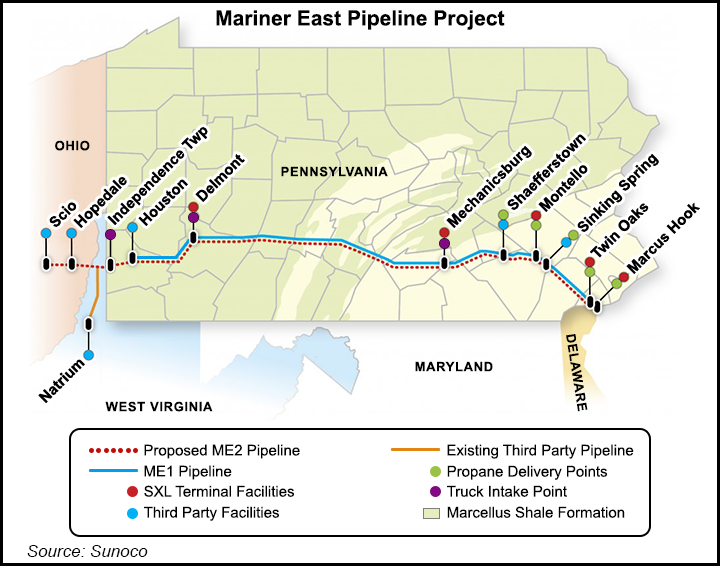Regulatory | Infrastructure | NGI All News Access
Service Intact After Another Sinkhole Forms Near Mariner East System in Pennsylvania
Yet another sinkhole has formed near the Mariner East (ME) pipelines in southeast Pennsylvania, but the system remains in service as state regulators investigate the latest incident, Energy Transfer LP confirmed on Thursday.

The Pennsylvania Public Utility Commission (PUC) said late Wednesday that it responded to reports of a sinkhole near several pipelines in Delaware County’s Middletown Township. The subsidence, PUC said, occurred along the right-of-way of ET subsidiary Sunoco Pipeline LP’s GRE Pipeline — a 12-inch steel line that moves petroleum products. Part of GRE was used late last year to start partial service on the ME 2 pipeline.
ET spokesperson Amanda Gorgueiro said no pipelines were exposed in the incident and it’s been determined that pipelines in the area are secure. “The area was immediately contained and grouted,” she said. “We have placed personnel in the area to continue to monitor the area. Our pipelines remain in service.”
No leaks or injuries were reported, the PUC said. Engineers from the commission’s Pipeline Safety Division have also been on site gathering more information and monitoring the lines.
Sunoco just brought ME 1 back into service on Tuesday after a sinkhole formed in January about 18 miles to the north of Middletown in Chester County and exposed the system. The pipeline had voluntarily been offline for more than three months while Sunoco and regulators worked to ensure a safe return to service. It wasn’t the first time operations have been suspended due to a sinkhole; others formed in the Chester County area early last year, prompting a similar closure.
ME 1, 2 and 2X, which has not entered service yet, have been plagued by regulatory and legal delays. ME 2 finally entered partial service late last year when part of the GRE line was tapped to bypass two areas in West Whiteland where construction remains on hold over other regulatory issues.
Indeed, the ME project has been confronted by subsidence issues from western to eastern Pennsylvania in areas of heavy coal mining or karst geological formations. According to the Pennsylvania Department of Conservation and Natural Resources (DCNR), certain parts of the state are more susceptible to sinkholes than others. Large areas of central and eastern Pennsylvania are underlain by the kind of bedrock that naturally erodes such as limestone, dolomite and marble.
The 70,000 b/d ME 1 entered service in the 1930s to move refined products, but was repurposed and began moving NGLs from one side of the state to the other about three years ago. The ME 2 and 2X projects run parallel along roughly the same path as ME 1 for about 350 miles to move liquids from processing facilities in Ohio, Pennsylvania and West Virginia to the Marcus Hook Industrial Complex near Philadelphia.
© 2024 Natural Gas Intelligence. All rights reserved.
ISSN © 1532-1231 | ISSN © 2577-9877 |
